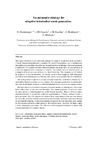Identificador persistente para citar o vincular este elemento:
https://accedacris.ulpgc.es/jspui/handle/10553/45234
| Título: | An automatic strategy for adaptive tetrahedral mesh generation | Autores/as: | Montenegro, R. Cascón, J. M. Escobar, J. M. Rodriguez, E. Montero, G. |
Clasificación UNESCO: | 12 Matemáticas | Palabras clave: | Tetrahedral mesh generation Adaptive refinement/derefinement Nested meshes Mesh smoothing Mesh untangling, et al. |
Fecha de publicación: | 2009 | Proyectos: | Simulacion Numerica de Campos de Viento Orientados A Procesos Atmofericos. Diagnostico y Prediccion de Recursos Eolicos y Solares. Modelos Numéricos Predictores Para la Gestión Medioambiental. |
Publicación seriada: | Applied Numerical Mathematics | Conferencia: | 2nd Chilean Workshop on Numerical Analysis of Partial Differential Equations | Resumen: | This paper introduces a new automatic strategy for adaptive tetrahedral mesh generation. A local refinement/derefinement algorithm for nested triangulations and a simultaneous untangling and smoothing procedure are the main involved techniques. The mesh generator is applied to 3-D complex domains whose boundaries are projectable on external faces of a meccano approximation composed of cuboids. The domain surfaces must be given by a mapping between meccano surfaces and object boundary. This mapping can be defined by analytical or discrete functions. At present, we have fixed mappings with orthogonal, cylindrical and radial projections, but any other one-to-one projection may be considered. The mesh generator starts from a coarse and valid hexahedral mesh that is obtained by an admissible subdivision of the meccano cuboids. The automatic subdivision of each hexahedron into six tetrahedra produces an initial tetrahedral mesh of the meccano approximation. The main idea is to construct a sequence of nested meshes by refining only those tetrahedra with a face on the meccano boundary. The virtual projection of meccano external faces defines a valid triangulation on the domain boundary. Then a 3-D local refinement/derefinement is carried out so that the approximation of domain surfaces verifies a given precision. Once this objective is reached, those nodes placed on the meccano boundary are really projected on their corresponding true boundary, and inner nodes are relocated using a suitable mapping. As the mesh topology is kept during node movement, poor quality or even inverted elements could appear in the resulting mesh; therefore, we finally apply a mesh optimization procedure. The efficiency of the proposed technique is shown with several applications to complex objects. | URI: | https://accedacris.ulpgc.es/handle/10553/45234 | ISSN: | 0168-9274 | DOI: | 10.1016/j.apnum.2008.12.010 | Fuente: | Applied Numerical Mathematics [ISSN 0168-9274], v. 59, p. 2203-2217 |
| Colección: | Artículos |
Citas SCOPUSTM
36
actualizado el 08-jun-2025
Citas de WEB OF SCIENCETM
Citations
27
actualizado el 08-feb-2026
Visitas 10
64
actualizado el 11-ene-2026
Descargas
219
actualizado el 11-ene-2026
Google ScholarTM
Verifica
Altmetric
Comparte
Exporta metadatos
Los elementos en ULPGC accedaCRIS están protegidos por derechos de autor con todos los derechos reservados, a menos que se indique lo contrario.
